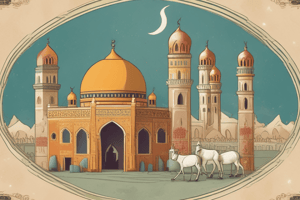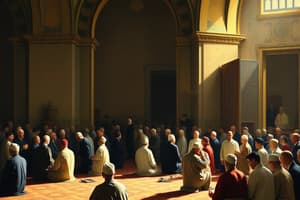Podcast
Questions and Answers
What percentage of the population in Syria is made up by the Alawi minority?
What percentage of the population in Syria is made up by the Alawi minority?
- 12% (correct)
- 20%
- 15%
- 10%
Which branch of Islam is characterized by its belief that Ali is the manifestation of God?
Which branch of Islam is characterized by its belief that Ali is the manifestation of God?
- Sunni
- Druze
- Shia
- Alawite (correct)
Which countries have Shia Muslims as a majority?
Which countries have Shia Muslims as a majority?
- Iran and Iraq (correct)
- Jordan and Lebanon
- Egypt and Turkey
- Saudi Arabia and UAE
What has been a consequence of the Iranian revolution of 1979 regarding Sunni regimes?
What has been a consequence of the Iranian revolution of 1979 regarding Sunni regimes?
What is a common perception among Shia populations in predominantly Sunni governed countries?
What is a common perception among Shia populations in predominantly Sunni governed countries?
What is the main obligation of Muslims during Eid al Fitr?
What is the main obligation of Muslims during Eid al Fitr?
Which of the following statements best captures the concept of Jihad in Islam?
Which of the following statements best captures the concept of Jihad in Islam?
What has caused the division within the Muslim community, known as the fitnah?
What has caused the division within the Muslim community, known as the fitnah?
What percentage of Muslims roughly identify as Sunni around the world?
What percentage of Muslims roughly identify as Sunni around the world?
Which of the following is NOT prohibited in Islamic practices?
Which of the following is NOT prohibited in Islamic practices?
Flashcards are hidden until you start studying
Study Notes
Islam
- Two most important religious holidays are Eid al-Fitr (end of Ramadan) and Eid al-Adha (Festival of Sacrifice).
- Muslims are obligated to donate a certain amount of food or money to the poor during Eid al-Fitr.
- A ram is sacrificed during Eid al-Adha.
- Muslims are prohibited from consuming alcohol, certain meats like pork and blood, gambling, and usury.
- Commandments include avoiding stealing, adultery, fornication, etc.
- Purification rites are performed during menstruation, after bedtime, after using the bathroom, after sex, or after being in contact with impure substances like corpses or wine.
- "Bismillah" (In the name of God) should be recited before any action.
- Two controversial issues in Islam include the status of women (polygamy, veiling) and Jihad.
- Jihad means "striving in the path of God" and can be interpreted in three ways: a) fighting against evil, b) personal struggle against sin, and c) holy war as an exceptional effort for the good of the Islamic community.
Denominations of Islam
- The unity of the Muslim community (Ummah) was broken after Muhammad's death.
- Two main branches of Islam emerged: Sunni and Shia.
Sunni Islam
- Sunnis follow the Sunnah, which is Muhammad's traditions or customs.
- Sunnis make up about 90% of Muslims worldwide, except in Iran, Iraq, Lebanon, and some Gulf states.
- Sunnis are subdivided into four legal schools.
Shia Islam
- Shia Muslims constitute about 10% of Muslims globally.
- Shia Muslims are the majority in Iran, Iraq, Bahrain, Azerbaijan, and Yemen.
- There are large Shia communities in Afghanistan, India, Kuwait, Lebanon, Pakistan, Qatar, Syria, Turkey, Saudi Arabia, and the UAE.
Druze
- Currently live in Syria, Lebanon, and Israel.
- Between 350,000 and 900,000 Druze people exist.
Alawite
- Literally, Ali's followers.
- Originated in the 9th century.
- Believe that Ali is the manifestation of God.
- Located in Syria and parts of Turkey.
- Their rituals incorporate pre-Christian and Christian elements, as well as Shia and Sunni Islamic practices.
- Estimated population: 1.5 to 2.5 million.
- The Alawite minority (12%) in Syria has ruled the country since 1970.
Sunni-Shia Relationship
- Sectarianism has played a role in recent crises.
- Shia Muslims often face poverty and discrimination under Sunni rule.
- Sunni extremists frequently label Shia Muslims as heretics who should be killed.
- The Iranian Revolution of 1979 launched a radical Shia Islamist agenda, perceived as a challenge to conservative Sunni regimes, particularly in the Gulf.
- Tehran's support of Shia militias and parties beyond its borders led to Gulf states strengthening their ties with Sunni movements.
- Many conflicts in the region have sectarian overtones.
Ibadi
- Also known as Ibadism.
- A branch of Islam separate from Sunni and Shia.
- Considered self-cephalic churches following the Byzantine rite.
- Comprises four patriarchs who separated from Rome in 1054.
Monophysites and Nestorians
- Emphasize the single nature of Christ, rejecting the Council of Chalcedon, which underscored the dual nature of Christ.
- Located in Egypt, Syria, Lebanon, Turkey, Iraq, and Iran.
Chaldean-Catholic Church
- Patriarch is in Baghdad, and liturgy is in Syriac.
- Population: More than 400,000.
Coptic-Catholic Church
- Located in Egypt.
- Head of the church is the Patriarch of Alexandria.
- Population: About 200,000.
Maronite Church
- Located in Lebanon, the US, Canada, Australia, etc.
- Rites are in Aramaic, Arabic, and other languages.
Christianity
- Includes Anglicans and Protestant churches.
- Introduced by the British and English, Scottish, and American Protestant missions during the 19th and 20th centuries.
Judaism
- The main figure is Patriarch Abraham.
- Originated in southern Mesopotamia (Ur of Chaldea).
- Emigrated to the land of Canaan (Palestine) promised by God to the children of Jacob (Israel).
- After the destruction of Jerusalem by the Romans in 70 AD, Jews scattered throughout the world.
- They maintained a spiritual bond through their rabbinical scriptures and traditions.
- Contains various interpretations of the Torah.
- Includes the Mishnah (meaning "to do again" or "repeat"), which encompasses Jewish oral traditions.
- The Mishnah is divided into six orders covering all aspects of life, including prayers, Sabbath, women, civil and criminal laws, and purity laws.
- The Talmud reviews the Torah and serves as a crucial addition to the written Torah.
- Contains 39 books organized into the Torah, Prophets, and Writings.
- Religious obligations include daily prayer, blessings, and temple attendance on the Sabbath.
- Main festivities include Yom Kippur (Day of Atonement) and Rosh Hashanah (New Year).
Ethnic-Cultural Branches of Judaism
- Sephardic (Spain).
- Askenazi (Central and Eastern Europe).
- Arab Jews, also called Oriental Jews.
- Currently, only 1.5% of Jews in the Middle East and North Africa live outside Israel and Palestine.
- Small communities remain In Turkey, Iraq, Iran, Morocco, Tunisia, Syria, and Egypt.
Groups Within Judaism
- Ultra-Orthodox and Orthodox, who hold fundamentalist and rigid interpretations of religion.
Kurds
- Live on the border between Turkey and Iraq (Iranian Kurdistan).
- Predominantly Sunni.
- Estimated population: 4 million.
- Compared to 12 million Kurds in Turkey and 6 million in Iran.
Iran
- Southern Khuzestan has a significant Arab population, mostly Shia, estimated at 3 million.
- Population is predominately Twelver Shia.
- Kurds are Sunni.
- Includes Assyrian Christians, Baha'is, and some followers of Zoroaster.
- Languages include Persian (Farsi), Turkish, and Kurdish, Baluchi, Arabic, Azerbaijani, and other dialects.
The Arab World
- Divided into four regions:
- Nile Valley
- Fertile Crescent
- Arabian Peninsula
- Maghreb
Nile Valley
- Includes Sudan and Egypt.
- Historically united due to their dependence on the Nile River.
- Culturally homogenous Arab-speaking population.
- Predominantly Sunni with a Coptic minority (5-10%).
Fertile Crescent
- Includes Iraq, Syria, Lebanon, Jordan, Israel, and Palestine.
- Agricultural region at the arch of the Syrian-Mesopotamian desert.
- Inhabited since the third millennium BC.
- Has been in constant interaction with various peoples, including Assyrians, Babylonians, Persians, Greeks, Romans, Arabs, Crusaders, Turks, and Circassians.
- Contains a Kurdish minority divided between Iraq and Syria.
- Armenian populations in Syria, Lebanon, and Iraq.
- Arabized Gypsies.
- Predominantly Sunni with 12 different Christian communities, including Protestants and Shia sects.
- Shia Muslims are concentrated in Iraq (50%), Lebanon (30%), and Syria (11%).
- Druze in Lebanon (8%).
Arabian Peninsula
- Desert of 3 million km2.
- Cradle of Arabs and Islam.
- Population: about 90 million.
- Includes Saudi Arabia (34.2 million inhabitants).
- Five smaller states with a combined population of 24 million: Kuwait, Bahrain, Qatar, UAE, and Oman.
- Yemen has 29.1 million inhabitants.
- Yemen's GDP per capita is $944 (2018 data), while Saudi Arabia's is $23,000 and Qatar's is $69,000.
Studying That Suits You
Use AI to generate personalized quizzes and flashcards to suit your learning preferences.




